Travellers' Tales
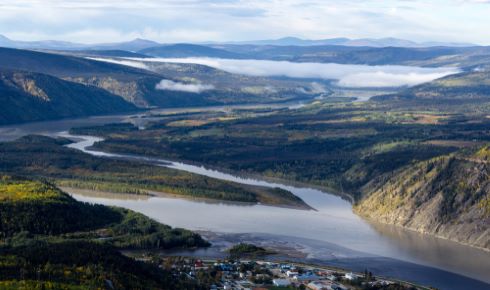
Over the past 10 years the RSB has helped fund travel costs for more than 90 early career biologists hoping to research, study or present abroad. We asked a selection of recipients how these travel grants helped develop and support their work
The Biologist 66(5) p36-39
Dr Fabrizio Alberti MRSB
Travelled to the 28th Fungal Genetics Conference in Asilomar, California, in 2014
This is the most important conference in my research field and I was awarded the prize for best poster in the Biochemistry and Metabolism category by the Genetics Society of America. I was also selected to give a talk and lead a discussion during the synthetic biology session with an audience of approximately 100 experts in the field.
The grant gave me the opportunity to give my very first talk at an international event and learn about the most up-to-date research being done in my field. Receiving the prize for the best poster in my category was a great professional achievement at that stage of my career.
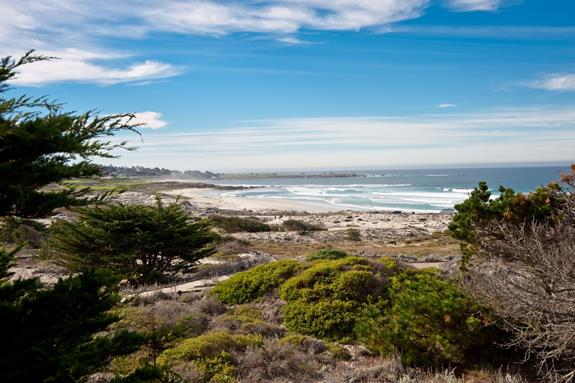 Asilomar, on the southern tip of Monterey Bay, California
Asilomar, on the southern tip of Monterey Bay, CaliforniaThe Asilomar event grounds are the most beautiful location I’ve ever been to for a conference, with lecture theatres and accommodation located within a natural reserve five minutes’ walk from the beach. The incredible science and the dynamic environment at the conference were truly inspiring and I decided there that I wanted to continue to work through my postdoc and to pursue a career in academia.
Fabrizio Alberti is a Leverhulme Trust early career research Fellow exploring the development of products made from fungi.
Dr Alicja Dabrowska MRSB
Attended the Gordon Research Seminar and Conference on Marine Microbes in Girona, Spain, in 2016
Gordon Research Seminars and Conferences are small, week-long events that aim to provide participants with time and space to interact and discuss unpublished research. There is a strict no photographs/no recordings policy to encourage scientists to share information, and all participants are expected to contribute to the discussions and informal activities. I was very keen to go there, not only for the opportunity to present my own research, but also to discover the directions marine microbiology research might take in the next few years.
It was a perfect opportunity to practise presenting to an international audience in a relatively small and friendly environment – first to scientists at a comparable level of experience and then to experts from different disciplines during the conference.
At the seminar I met other early career researchers who were working on very exciting projects and it was great to share our experiences, plans, ideas and worries about the future of the field and our careers. Being able to talk to authors of ground-breaking papers during meals or free time gave me a chance to ask all the burning questions I had about their work. The feedback I received on my data and the up-to-date knowledge of other researchers’ work influenced the direction of my PhD project.
The last night of the conference coincided with Saint John’s Eve. I had an amazing evening with my new friends. We said goodbye to spring and the successful conference, and hello to summer and the future of marine microbiology – all while watching fireworks and bonfires in Tossa de Mar.
The grant and the conference visit helped me to secure interviews for postdoc positions and my current employment.
Alicja Dabrowska is now a postdoctoral research associate at the Department of Physics and the Department of Veterinary Medicine at the University of Cambridge, where she is working on the development and optimisation of low-cost bacteria identification methods.
John Godlee AMRSB
Travelled to the Kluane Lake Field Research Station and Herschel Island, Yukon, Canada, in 2016
With an RSB travel grant I was able to take part in an expedition investigating ecosystem-level effects of climate change in wilderness areas of the Canadian Arctic.
I worked with a team of PhD students from the University of Edinburgh who conducted a number of studies related to shrub expansion, plant decomposition and herbivory.
The grant enabled me to visit two sites over the course of a single growing season and make direct comparisons across a wide latitudinal gradient.
At the time of the expedition I had just finished my undergraduate degree at the University of Edinburgh and was looking to gain practical skills that could help further my career in ecological research.
For our fieldwork in Yukon we walked up from Kluane Lake Research Station into the hills every day to survey plant traits of various wildflower species. Over just three weeks the landscape changed rapidly as the season progressed and different species of flower emerged and set seed.
On a few occasions we saw bears rooting around in the wildflower meadows and one time found ourselves far too close to one, although it was too busy digging up roots to notice us. After a long day there was nothing better than the cleansing rush of running from the sauna into the ice-cold lake.
I learned a great deal about biodiversity monitoring techniques, managing data in the field, and how to manage a field team, which served me well during my PhD, for which I have conducted my own field expeditions, albeit in southern African woodlands rather than Arctic shrubland.
John Godlee is currently pursuing a PhD at the University of Edinburgh investigating the mechanisms driving the relationship between tree biodiversity and ecosystem productivity in southern African miombo woodlands.
 The Yukon River, Canada.
The Yukon River, Canada. Kimberley Slinger MRSB
Travelled to the Balule Game Reserve, within the Greater Kruger National Park, South Africa, in 2013
I travelled to the Balule Game Reserve as a volunteer with Operation Wallacea, assisting them with data collection and attending a savannah ecology course.
I was keen to gain experience in research techniques in a unique environment in an area that would be beneficial to my degree modules the following term, particularly animal behaviour and conservation, and to give me a greater insight into potential career options.
I gained skills in research techniques in the field (including game transects, bird population surveys and insect pitfall traps) and learned the importance of appropriate methods of data acquisition for specific research questions.
One highlight was being in a carnivore lecture when it was radioed in that two young male lions had been spotted eating a fresh kill of a baby giraffe. We piled into the game vehicles and drove to the location to observe. Another highlight was a night-time drive through the bush, which sounded very different to during the day, rounded off by a night-time camp in the bush where we could hear the African wild dogs very close to camp.
This experience benefited my application for a paid summer internship the following year, which directly led to my PhD project.
Kimberley Slinger is now a final-year PhD student at the University of Nottingham, exploring monogastric animal nutrition and gut health.
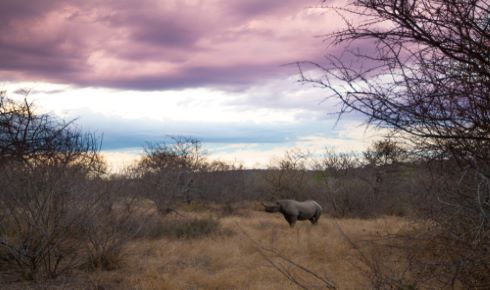 The Balule Game Reserve, within the Greater Kruger National Park, South Africa
The Balule Game Reserve, within the Greater Kruger National Park, South AfricaDr Stevie Anne Bain MRSB
Presented at the Society of Molecular Biology and Evolution (SMBE) 2018 conference in Yokohama, Japan
Spending time in Japan, specifically Yokohama and Tokyo, was an amazing experience. The heat was intense as we travelled in July, and the streets were bustling and vibrant. We tried to immerse ourselves in local culture as much as possible, sampling traditional food and visiting places of cultural interest. Our problem-solving and teamwork skills were also put to the test in navigating the subway system!
I was keen to attend and present at SMBE18 as this conference brings together a large international community of molecular and evolutionary biologists to discuss progress in these fields. I invited a few researchers from the US to my presentation. Due to their location we would not have the chance to discuss our work at any other time.
We also chatted about alternative analyses that could be run on my dataset. I was able to directly discuss how my own results compared to the results of other labs working on similar projects. Discussions I had with other researchers at SMBE18 directly influenced my own research as I incorporated new analyses and discussion points into my thesis.
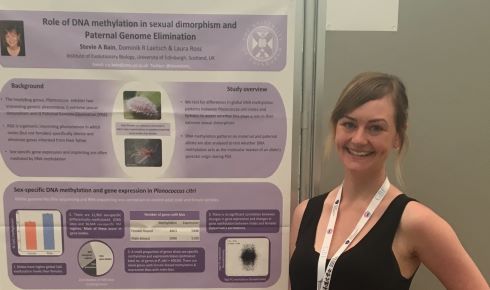 Stevie Anne Bain (above) is currently a postdoctoral research associate in bioinformatics education. She works in genetics, epigenetics, bioinformatics and education at the University of Edinburgh
Stevie Anne Bain (above) is currently a postdoctoral research associate in bioinformatics education. She works in genetics, epigenetics, bioinformatics and education at the University of EdinburghDr Clare Bird MRSB
Travelled to Concepción in Chile for the International Symposium on Foraminifera in 2014
This symposium is only held every four years and I was keen to go because I had not long returned to science after a career break. It was the first symposium in my new field, foraminifera – amoeboid protists characterised by their granular ectoplasm for catching food and other uses – and I was keen to meet other scientists and share my work.
Aside from getting practice in producing and presenting a poster, the main positive outcomes for me were the networking opportunities. I was able to speak with other scientists from PhD students to professors, and have maintained a number of those connections. These include friendships as well as collaborative research. I have collaborated with three different groups as a result, directly or indirectly, of attending that conference, and I have published two papers and two more are in review.
Clare Bird is an Anniversary Fellow at the University of Stirling, where she studies the microbiome of planktonic foraminifera from polar seas.
Lisa Gray MRSB
Spoke at the 22nd World Orchid Conference in Ecuador in 2017
After growing my first orchids from seeds I was hooked. Their captivating educational power and unusual adaptations make them excellent subjects for plant biology.
I took a break from teaching to volunteer at Lankester Botanical Gardens, Costa Rica, where I learned a vast amount and developed potential education projects using orchids. The RSB travel grant then allowed me to travel to the World Orchid Conference in Ecuador, where I did a presentation on developing orchid-centred education programmes.
The grant was the stepping stone that enabled me to travel and opened up a world of experiences and new contacts. It continues to connect me to scientific writing, orchid research and current scientific affairs, which in the busy life of a teacher can sometimes be a challenge.
I have returned to full-time teaching at Wolverley High School in Worcestershire, where my colleague Philip Seaton runs an orchid micropropagation project. We hope to submit a talk to the International Orchid Conservation Congress at Royal Botanic Gardens, Kew, in 2019 and to attend the 23rd World Orchid Conference in Taiwan in 2020.
Where orchids and education will take me next is unknown, but it is an exciting area of science, with many new discoveries and increasing media attention.
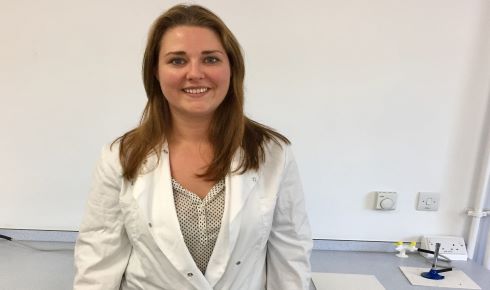 Lisa Gray (above) is a teacher at Wolverley High School, Worcestershire.
Lisa Gray (above) is a teacher at Wolverley High School, Worcestershire.Dr Laetitia Gunton MRSB
Attended the triennial Deep-Sea Biology Symposium (DSBS) in Aveiro, Portugal, in 2015
The venue for the DSBS, the most important meeting for deep-sea biologists around the world, was the Cultural and Congress Centre of Aveiro, an old ceramics factory by the main canal in the city centre.
There was a session dedicated to submarine canyons, and I was extremely keen to attend in order to present my research to members of the scientific community and to discover what other research was being conducted in the field of deep-sea biology around the world.
In the deep-sea canyon oral session, I asked one of the keynote speakers a question, and after the session one of the ‘big names’ in the field came up to me and commented that I had asked a very interesting question. For me it was like a world-famous celebrity complimenting me!
I spoke to researchers from around the world about the results of the last chapter of my thesis. I was able to meet face to face with my collaborators from Ghent University, Belgium, and discuss the manuscript we were working together on. I learned about deep-sea research being carried out around the world and left the conference feeling inspired and motivated to carry on with my own research and finish writing up my PhD thesis.
The conference dinner, held in a wine cellar in the city of Porto overlooking the Douro River and Porto skyline, was a highlight, as was the excellent port that accompanied the meal.
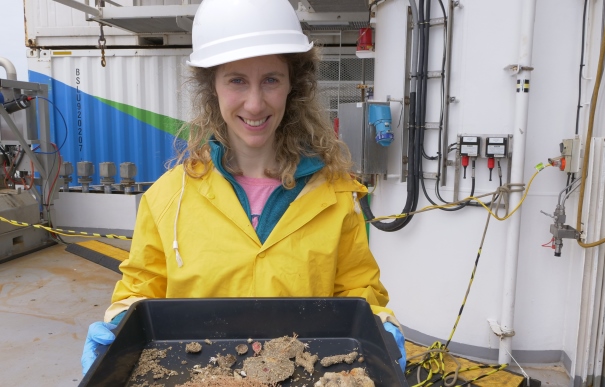 Laetitia Gunton (above) is the Chadwick Biodiversity Fellow at the Australian Museum, Sydney, interested in the taxonomy, species distribution and diversity of deep-sea annelids (marine worms) around the east and southern coast of Australia.
Laetitia Gunton (above) is the Chadwick Biodiversity Fellow at the Australian Museum, Sydney, interested in the taxonomy, species distribution and diversity of deep-sea annelids (marine worms) around the east and southern coast of Australia.William Mills AMRSB
Travelled to the Stable Isotope Laboratory at the Estación Biológica de Doñana, Seville, in 2018
In Seville I learned how to prepare feather samples for stable isotope analysis, a technique that I have since used in my PhD thesis. The method enables me to gain valuable insights into the ecology of marine birds, such as their diet and foraging areas.
The RSB travel grant gave me the opportunity to establish new collaborations, experience a different academic environment and learn new laboratory techniques. I would definitely recommend that other early career researchers apply for a travel grant. The process is straightforward and provides a great opportunity to meet other researchers and learn new skills.
William Mills is currently a PhD student at the University of Exeter with a particular interest in seabirds and other marine predators.


